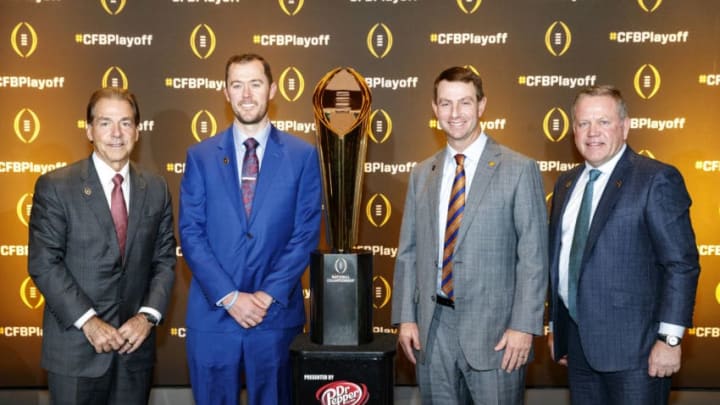Who are college football’s most successful head coaches from the past five seasons? You might be surprised at who makes the list.
Which FBS head football coaches of late have had the best and most accomplishments from the past five seasons?
After looking at the coaching resumes over the past five years by inspecting and analyzing their recent on-field accomplishments, 10 coaches have shown to have been the most proficient and accomplished. These 10 are a select group who have impressive accomplishments with division and conference championships as well as bowl victories and playoff appearances.
There’s not much debate that many of these current and soon to be Hall of Fame coaches are still going strong. There are also some less experienced head coaches who have emerged as up-and-coming potential Hall of Fame members but how do their on-field accomplishments compare to one another?
When college football commentators, sportswriters and fans on social media compile best head coaching lists, it more than likely includes personal biases and is, for the most part, highly subjective in numerous instances.
Even though there are those who may see flaws in these rankings based on their own personal preferred criteria and furthermore, this list may not be perfect and the point system is not flawless, but it gives some math-based analysis to eliminate the subjective factors that many rankings of coaches are comprised of.
In the compilation of the top head coaches in college football over the past five seasons, there are numerous factors that were taken under consideration.
First, coaches had to meet requirement of having won some type of championship.
They must have won at least one national title, conference championship and/or division title in a Power Five conference or was in the College Football Playoff in the past decade. Second, he has to have been a head coach at a Power Five conference for at least two full seasons during this five years.
Below are some of the many factors that went into the making of the rankings:
- The amount of time that a head coach has been in the FBS and a Power Five conference.
- Ability to recruit highly-rated players as part of an incoming class of student-athletes so that they were able to be successful on the field as freshmen and sophomores.
- The ability or inability to handle off-field issues such as having their program being put on probation or sanctions so that it did not affect on-field performance.
- The previous condition of the program, good or bad, prior to them becoming head coach.
- The perception and reputation of being or not being a great Xs and Os coach or being a pure defensive or offensive-minded coach.
- Not critiquing how the coach influences the ADs handling of the schedules in terms of it being difficult or easy when picking non-conferences opponents each season as it affected on-field performances.
- How well the coach is perceived as making in-game decisions and play-calling during games.
- The ability to hire assistant coaches who recruit well and help advance the program overall.
- Factoring in a coach who is at a traditional powerhouse program or a lower-level Power Five program.
Third, below is the criteria and scoring breakdown to determine the ranking of the top coaches in the FBS over the past five seasons:
- 50 points for a national championship
- 40 points for College Football Playoff appearance
- 30 points for conference title
- 20 points for division title
- 10 points for bowl game victory (includes playoff games)
- 5 points for bowl appearance (includes playoff games)
- 5 points for every season with 10 or more wins
To reiterate what coaches qualified to be included in these rankings, the coach had to be at an FBS school from the period covering the seasons from 2015-19. He had to have won at least one national championship and/or a conference or division title while a coach in a Power Five conference or upper-echelon Group of Five conferences during the span of the last five seasons. The coach has to be currently coaching an FBS team for this upcoming season and been a head coach in a Power Five conference for at least two full seasons.
Let’s now take a look at the top 10 college coaches over the past five seasons.
